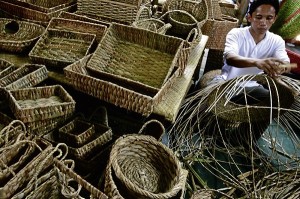Water lily handicraft trade pays off in Las Piñas

WEAR IT, WEAVE IT Thursday’s Water Lily Festival in Las Pinas was both a trade and a fashion show highlighting the business potentials of the plant that grows in abundance in local waterways. In the beauty pageant where contestants donned gowns made of water lily stalks and leaves, grand prize winner Lyra Velchez (No. 16) floated above the rest in her meticulously tailored dress. PHOTO BY NIÑO JESUS ORBETA
Starting out as a backyard industry nearly a decade ago, the water lily handicraft business especially in Las Piñas City is booming as more people take notice of the wide range of products that can be made out of the plant that grow in abundance even in urban waterways.
Some of these products were put on display at the 7th Water Lily Festival held on Thursday at Carnival Court, BF Resort Village, Las Piñas City, a brainchild of former Rep. Cynthia Villar that promotes water lily-based livelihood projects.
These included baskets, trays, chests, bags, traditional bags (bayongs), hampers, cabinets, lamp shades of different shapes and sizes—and even a dining table complete with chairs. The smaller items range from coasters to slippers.
But as an added demonstration of the plant’s artistic and commercial uses, the festival also featured a beauty pageant wherein contestants donned gowns fashioned completely from dried water lily stalks and leaves.
“This goes to show that with creativity, you can do a lot with water lilies,” Villar said at the sidelines of the event.
Villar noted that aside from providing livelihood for hundreds of families in Las Piñas, the water lily business has also cleaned up the city’s waterways.
“The industry has become so successful our Zapote River is now free of water lilies and fish have begun breeding here again. We are now getting our water lilies from the Laguna de Bay, and I hope the lake will also be cleared of water lilies because of this business,” she said.
Leaps and bounds
Rosendo Torres, who teaches how to make crafts and furniture from water lilies under the Villar Foundation, said the industry has grown by leaps and bounds since the first entrepreneurs tested the material about a decade ago.
“We have developed so many products since then, and we have more ideas in the pipeline. More importantly, the market for these products and the profits we get from them have increased as well,” he told the Inquirer in an interview.
Torres, himself an exporter who first dabbled in handicraft making in 1985 and tried water lily in 2000, said his buyers had since ranged from individual patrons to supermarkets and department stores which place orders in bulk.
“Some exporters have also approached and bought products from us, shipping them to the United States, Europe, and Japan. Our water lily slippers are popular especially in Japan,” he noted.
Torres said the hampers, for example, sell for P750 and P900 each, while the trays sell for P100 to P200 each. A lampshade would be worth at least P500, while a three-drawer cabinet, P5,500. A dining set made up of a table and four chairs (with metal or wooden supports) would be worth P25,000.
“In terms of profits, seven years ago we were selling (items at) about P25,000 to P30,000 per month. Now we are selling upwards at P100,000 per month,” Torres said.
Holiday season demand
Sales go up during the holiday season when orders for popular Christmas gifts like baskets, trays, and ornamental pots shoot up.
To cope with demand, the foundation hires about 100 more workers, in addition to the 50 who work during off-peak seasons.
“It’s a very profitable business, especially since you really don’t need a big capital to start this up. You just need to harvest water lilies, dry them, and start working on them. So many workers become interested in this livelihood,” Torres said.
Torres has been working for the Villar Foundation for seven years, teaching the craft to interested organizations or local governments nationwide.
“I’ve taught thousands of people the skills they need to start a water lily handicraft business. Just recently, we went to Davao to teach the folks there,” he said.
Torres said the industry still has room to grow especially overseas, and that people can still think of many other products which can be made from water lilies.
“Right now, we’re developing charcoal from dried water lily stalks,” he said. “Also, I’m looking at using the stalks and leaves as a leather substitute to be used in bags.”















